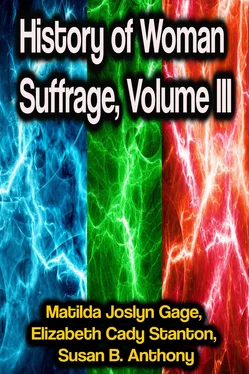We know the ignorance that exists upon these points. Few have yet begun to comprehend the influence that ecclesiasticism has had upon law. Wharton, a recognized authority upon criminal law, issued his seventh edition before he ascertained the vast bearing canon law had had upon the civil code, and we advise readers to consult the array of authorities, English, Latin, German, to which he, in his preface, refers. We hope to arouse attention and compel investigation of this subject by lawyers and theologians as well as by women themselves.
Francis E. Abbot, editor of The Index , the organ of the Free Religious Association, spoke grandly in favor of the resolutions. He said:
These resolutions we have read with astonishment, admiration and delight. We should not have believed it possible that the convention could have been induced to adopt them. They will make forever memorable in the history of the organized woman movement, this thirtieth anniversary of its birth. They put the National Woman Suffrage Association in an inconceivably higher and nobler position than that occupied by any similar society. They go to the very root of the matter. They are a bold, dignified, and magnificent utterance. We congratulate the convention on a record so splendid in the eyes of all true liberals. From this day forth the whole woman movement must obey the inspiration of a higher courage and a grander spirit than have been known to its past. Opposition must be encountered, tenfold more bitter than was ever yet experienced. But truth is on the side of these brave women; the ringing words they have spoken at Rochester will thrill many a doubting heart and be echoed far down the long avenue of the years.
During the same week of the Rochester convention, the Paris International Congress opened it sessions, sending us a telegram of greeting to which we responded with two hundred and fifty francs as a tangible evidence of our best wishes. The two remarkable features of that congress were the promise of so distinguished a man as Victor Hugo to preside over its deliberations, though at last prevented by illness; and the fact that the Italian government sent Mlle. Mozzoni as an official delegate to the congress to study the civil position of woman in various countries, in order that an ameliorating change of its code, in respect to woman, could be wisely made.
The newspapers of the French capital in general treated the congress with respect. The Rappel , Victor Hugo's organ, spoke of it in a most complimentary manner. Theodore Stanton, in a letter to the National Citizen , said:
In one important respect this congress differed entirely from an American convention of like character—it made no demand for suffrage. The word was never mentioned except by the American delegates. In continental Europe the idea of demanding for woman a share in the government, is never considered. This is the more remarkable in France, as this claim was made at the time of the revolution. But every imaginable side of the question was discussed, except the side that comprehends all the others. To an American, therefore, European woman's rights is rather tame; it is like the play of Hamlet with Hamlet left out. But Europe is moving, and the next international congress will, undoubtedly, give more attention to suffrage and less to hygiene.
The Eleventh Washington Convention was held January 9, 10, 1879. The resolutions give an idea of the status of the question, and the wide range of discussion covered by the speakers:[45]
Resolved , That the forty-fifth congress, in ignoring the individual petitions of more than three hundred women of high social standing and culture, asking for the removal of their political disabilities, while promptly enacting special legislation for the removal of the political disabilities of every man who petitioned, furnishes an illustration of the indifference of this congress to the rights of citizens deprived of political power.
Whereas, Senator Blaine says, it is the very essence of tyranny to count any citizens in the basis of representation who are denied a voice in their laws and a choice in their rulers; therefore,
Resolved , That counting women in the basis of representation, while denying them the right of suffrage, is compelling them to swell the number of their tyrants and is an unwarrantable usurpation of power over one-half the citizens of this republic.
Whereas, In President Hayes' last message, he makes a truly paternal review of the interests of this republic, both great and small, from the army, the navy, and our foreign relations, to the ten little Indians in Hampton, Va., our timber on the western mountains, and the switches of the Washington railroads; from the Paris Exposition, the postal service, the abundant harvests, and the possible bull-dozing of some colored men in various southern districts, to cruelty to live animals, and the crowded condition of the mummies, dead ducks and fishes in the Smithsonian Institute—yet forgets to mention twenty million women robbed of their social, civil and political rights; therefore,
Resolved , That a committee of three be appointed from this convention to wait upon the president and remind him of the existence of one-half of the American people whom he has accidentally overlooked, and of whom it would be wise for him to make some mention in his future messages.
Whereas, All of the vital principles involved in the thirteenth, fourteenth and fifteenth constitutional amendments have been denied in their application to women by courts, legislatures and political parties; therefore,
Resolved , That it is logical that these amendments should fail to protect even the male African for whom said courts, legislatures and parties declare they were expressly designed and enacted.
Resolved , That the judges of the Supreme Court of the United States in denying Belva A. Lockwood admission to its bar, while she was entitled under the law and under its rules to that right, violated their oath of office.
Resolved , That the Senate Judiciary Committee, Mr. Edmonds chairman, in its report on the bill to allow women to practice law in the courts of the United States in which it declares that "further legislation is not necessary," evaded the plain question at issue before it in a manner unworthy of judges learned in the honorable profession of the law, and thereby sanctioned an injustice to the women of the whole country.
Whereas, The general government has refused to exercise federal power to protect women in their right to vote in the various States and territories; therefore,
Resolved , That it should forbear to exercise federal power to disfranchise the women of Utah, who have had a more just and liberal spirit shown them by Mormon men than Gentile women in the States have yet perceived in their rulers.
Whereas, The proposed legislation for the Chinese women on the Pacific slope and for outcast women in our cities, and the opinion of the press that no respectable woman should be seen in the streets after dark, are all based upon the presumption that woman's freedom must be forever sacrificed to man's licence; therefore,
Resolved , That the ballot in woman's hand is the only power by which she can restrain the liberty of those men who make our streets and highways dangerous to her, and secure the freedom that belongs to her by day and by night.
Frances E. Willard
At the close of the convention it was decided at a meeting of the executive committee to present an address to the president and both houses of congress, and that a printed copy of the resolutions should be laid on the desk of every member. The president having granted a hearing,[46] the following address was presented:
To his Excellency, the President of the United States :
Читать дальше












